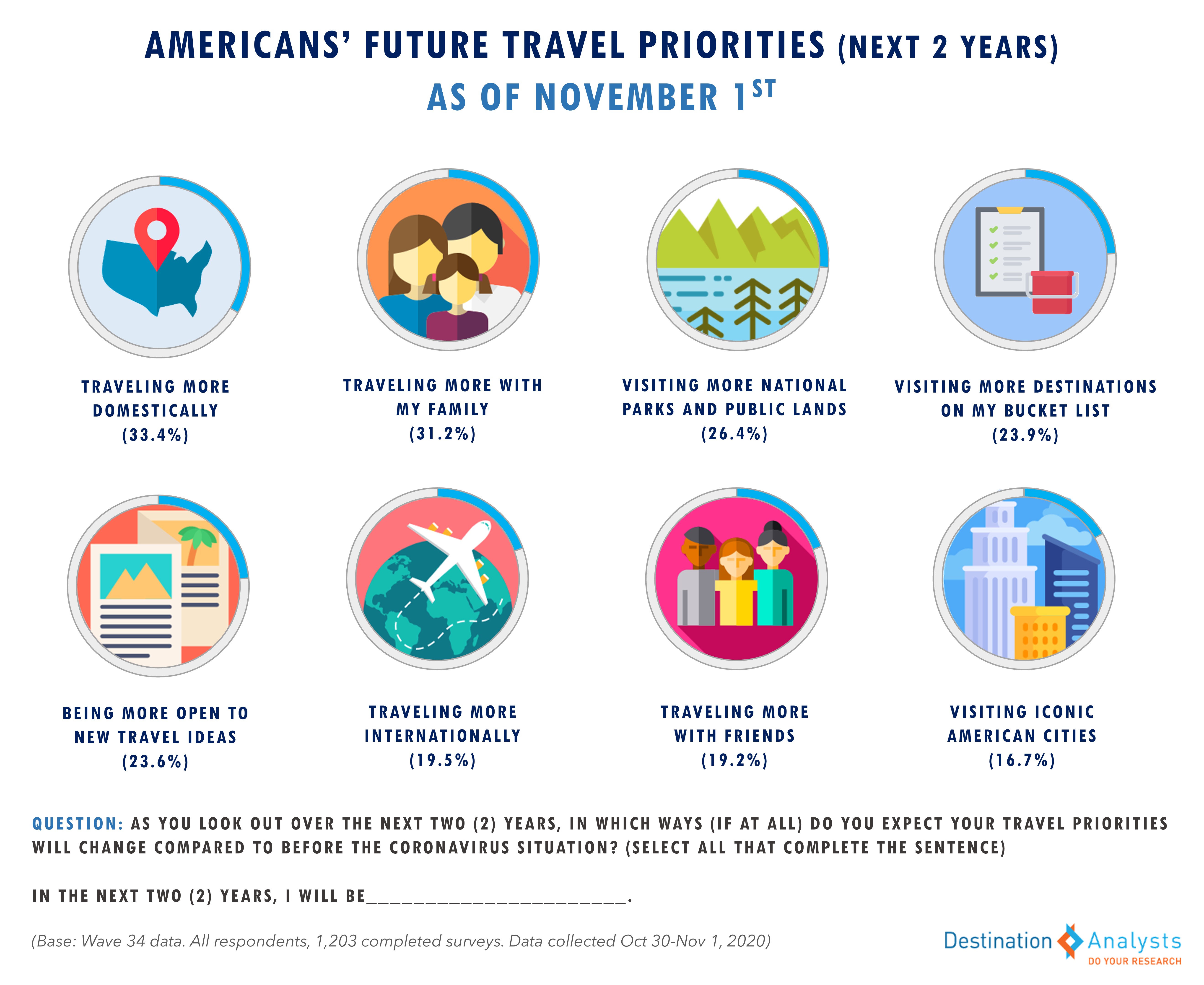Update on American Travel in the Period of Coronavirus—Week of November 2
Americans largely see the immediate future as a difficult one in regard to the pandemic, making a significant proportion to associate guilt and irresponsibility with travel right now. As they look to their travel future, the pandemic has shifted their priorities to focus more on exploring the United States and spending time with their families.

IMPORTANT: These findings are brought to you from our independent research, which is not sponsored, conducted, or influenced by any advertising or marketing agency. Every week since March 15th, Destination Analysts has surveyed 1,200+ American travelers about their thoughts, feelings, perceptions and behaviors surrounding travel in the wake of the coronavirus pandemic and explored a variety of topics. The findings presented below represent data collected October 30th-November 1st.
Key Findings to Know:
- American travelers have been increasingly prioritizing relaxation as a lifestyle priority. Perhaps in part to this, the average level of daily stress Americans have been feeling has been on the decline since the summer.
- Virus anxiety is uneven across the country—now highest in the Northeast and Southern regions, among Gen X, urban residents and those feeling not yet ready to travel.
- American travelers are somewhat split on maintaining their optimism; however, they largely see the immediate future as difficult. This week 60.9% expect the pandemic situation to get worse in the United States in the next month, up over 5% in one week.
- The worsening feelings about the pandemic continue to negatively impact sentiment towards travel in the near-term. Excitement levels about taking a getaway in the next month, openness to travel inspiration, and confidence they can travel safely decreased, while perceptions of travel activities as unsafe again increased.
- These feelings extend into greater emotional depth. Fully half agree that traveling right now feels irresponsible. Over 40% feel, or would feel, guilty traveling right now.
- The declining sentiment towards travel has affected behavior, as well, including for the upcoming Thanksgiving holiday. While 13.6% definitively say they will travel for Thanksgiving this year–down slightly from 15.8% the week of August 17th, those that felt uncertain in August have largely moved to “no” for Thanksgiving trips.
- Of those traveling for the Thanksgiving holiday, nearly 80% describe this as trips taken primarily to spend time with friends and family in their homes. The mean distance traveled will be 533 miles, and the average reported trip length will be 4.3 days.
- However, given travel’s importance to Americans, it continues. This week, fewer agree that they have lost their interest in/taste for traveling for the time being. Americans travel readiness state-of-mind remained stable (54.6%), as did the proportion that say they will engage in travel avoidance until the coronavirus situation is more resolved (54.7%). There is also a declining need for a vaccine to travel (39.5%).
- As to how the pandemic has shifted priorities and the way this will potentially impact travel in the longer term, the most agreement was shared that they would be traveling more domestically/seeing the United States and traveling more with family in the next 2 years.
- Don’t forget to register to attend a full update of these findings on Tuesday, November 3rd at 11:00am ET.
Although Tuesday’s election and rising COVID-19 cases certainly serve as sources of potential tension, since April, American travelers have been increasingly prioritizing relaxation as a lifestyle priority. Perhaps in part to this, the average level of daily stress Americans have been feeling has been on the decline since the summer.
Overall, the percent of Americans who feel high degrees of concern about personally contracting COVID-19 trended down this week to 69.3% from 72.0%. Virus anxiety is uneven across the country—now highest in the Northeast and Southern regions, among Gen X, urban residents and those feeling not yet ready to travel.
American travelers are somewhat split on maintaining their optimism, with 32.9% believing things will get better soon and 38.2% not. However, they largely see the immediate future as difficult. This week 60.9% expect the pandemic situation to get worse in the United States in the next month, up over 5% in one week. In addition, 62.6% expect this Coronavirus will thrive in the upcoming cold weather.
The worsening feelings about the pandemic continue to negatively impact sentiment towards travel in the near-term. Excitement levels about taking a getaway in the next month and openness to travel inspiration decreased again this week, while perceptions of travel activities as unsafe again increased. Confidence that they can travel safely in the current environment eroded 5 percentage points in the past 3 weeks (26.5% from 32.0%). Even comfort going out for leisure activities in their own communities has similarly declined (41.7% from 47.4% October 18th).
These feelings extend into greater emotional depth. Fully half agree that traveling right now feels irresponsible. Over 40% feel, or would feel, guilty traveling right now.
The declining sentiment towards travel has affected behavior, as well, including for the upcoming Thanksgiving holiday. The percent with any trip plans declined to 72% from 75%. While 13.6% definitively say they will travel for Thanksgiving this year–down slightly from 15.8% the week of August 17th, those that felt uncertain in August have largely moved to “no” for Thanksgiving trips. Of those traveling for the holiday nearly 80% describe this as trips taken primarily to spend time with friends and family in their homes. The mean distance traveled will be 533 miles, although two-thirds will travel less than 500 miles. The average reported trip length will be 4.3 days. While half will stay in the home of a friend or relative, about 18% say they will stay in a luxury hotel property and another 18% plan to stay in a 3 or 4-star hotel. These travelers report they will gather with an average of 5.7 people for their Thanksgiving celebration.
.
However, given travel’s importance to Americans, it continues. This week, fewer agree that they have lost their interest in/taste for traveling for the time being (down to 42.4% from 46.6%). Americans travel readiness state-of-mind remained stable (54.6%), as did the proportion that say they will engage in travel avoidance until the coronavirus situation is more resolved (54.7%). There is also a declining need for a vaccine to travel (39.5%). As to how the pandemic has shifted priorities and the way this will potentially impact travel in the longer term, this week we asked Americans “as you look out over the next two years, in which ways (if at all) do you expect your travel priorities will change compared to BEFORE the Coronavirus situation?” The most agreement was shared that they would be traveling more domestically/seeing the United States and traveling more with family. Nearly a quarter say they will be visiting more destinations on their bucket list and saying yes to new travel ideas and experiences.









